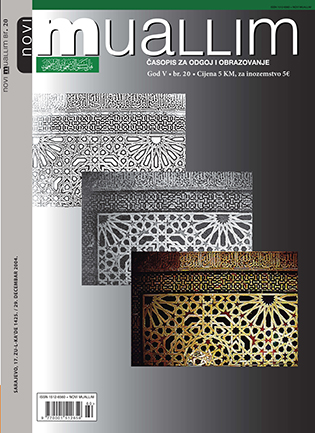THE HOLY FOR OTTO RUDOLPH AND THE ISLAMIC MYSTICISM
DOI:
https://doi.org/10.26340/muallim.v5i20.1210Abstract
Otto’s understanding of Islam is in line with his concept of numinous experience of the Holy, that is, in line with his interpretation of God in his Biblical, non-rational essence, of the living God, God of anger, love, feelings, God different from every plain worldly mind, whose nonrational essence eludes every philosophy and rationalization. Based on his partial insight into the Muslim mystical tradition, Otto was convinced that the Muslim mystical experience, as is the case with most mystical experiences, and Muslim numinous experience meet and imbue each other in many ways. Otto is aware of the fact that most religions have in their traditions both numinous (theistic) and mystical experiences. The Islamic mystical experience, characterized by incommunicability, non-dogmatic discourse and heighten state of religious consciousness appeared to Otto as per exelence numinous experience of the Holy. Still, Otto’s numinous experience is conceived in a way that it most often appears suddenly, as if out of here, roaringly eerie (mysterium tremendum), in front of which man turns into dust. Such a numinous experience generates feelings of one’s own inadequacy, imperfection and nothingness. Numinous experience, as portrayed by Otto, viewed from the ontological level, is happening in the distinct “subject – object” dualism. Such an axiological and ontological distinction between subject (Godly) and object (human) can hardly be translated into the mystical experience of the Islamic mystical identification with God, not through love, and especially not thorough the substantial identification. After all, the Sufi religious experience represents diving into the Eternity “here” and “now”. Otto’s idea of the Holy, conceptually rounded in the numinous experience, in its essence, belongs to the Biblical religion, based on eschatological telos of the wholeness.
Downloads
Published
How to Cite
Issue
Section
License
Naknada:
a. Časopis ne naplaćuje naknadu za obradu članaka (APC) i naknadu za podnošenje članaka.
Autori koji objavljuju u ovom časopisu pristaju na sljedeće uvijete:
- Autori zadržavaju autorska prava i pružaju časopisu pravo prvog objavljivanja, pri čemu će rad jednu godinu po objavljivanju biti podložan licenci Creative Commons imenovanje koja omogućuje drugima da dijele rad uz uvijet navođenja autorstva i izvornog objavljivanja u ovom časopisu.
- Autori mogu izraditi zasebne, ugovorne aranžmane za ne-ekskluzivnu distribuciju rada objavljenog u časopisu (npr. postavljanje u institucionalni repozitorij ili objavljivanje u knjizi), uz navođenje da je rad izvorno objavljen u ovom časopisu.


